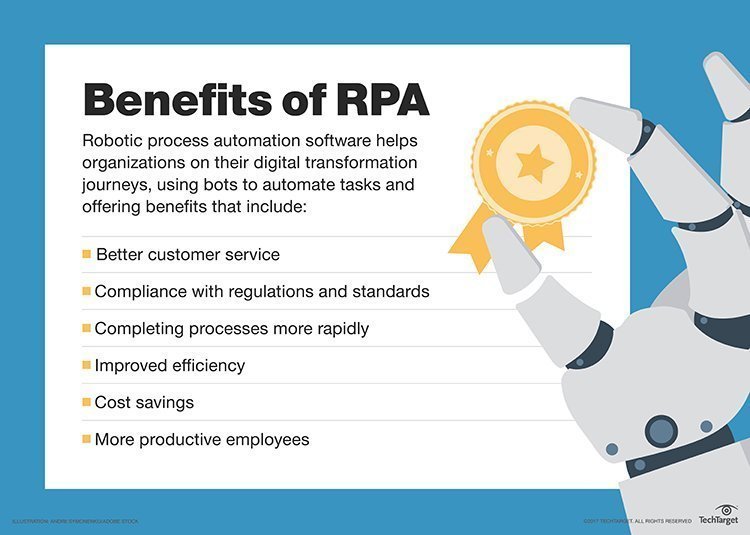Robotic Process Automation or RPA is a software that automates manual, rule-based and high volume processes, freeing the human worker to focus on higher-value work. According to a recent study, more than half of the enterprises working across industries have already started their automation journey. There are students opting for a Data Engineering course so that they can easily move forward with their career aspirations.
Enterprises that are still in two minds, run the risk of missing out on huge opportunities that RPA brings — reduced operating costs, improved productivity, improved compliance, and enhanced customer service.
From extracting clinical documents to improving payments, Robotic Process Automation benefits are unmeasured in the healthcare industry. With data analytics increasing rapidly, RPA along with data helps streamlining the processes, and provides better assistance to patients, thereby improving the overall healthcare cycle in the long run. RPA bots have the ability to use structured data to analyze information, and improve decisions and processes. As they help take over basic, repetitive tasks, it frees up an employee to focus on higher-value work and responsibilities.
Some Use Cases Of RPA In Healthcare:
- Patient onboarding
- Claims processing
- Claims management and reporting
- Patient registration
- Patient data management
- Accounts settlement
- Billing
- Claims administration
- Compliance risk
- Remittance management
In short, we can say that with a plethora of use cases, RPA is growing at a rapid pace, empowering customers to kick-start their automation and AI journey. RPA combined with Artificial Intelligence, Machine Learning, Natural Language Processing, and data analytics possesses a transformative potential that’s unimaginable.
Big Data In Healthcare
What is Big Data? Big Data refers to when a massive amount of information is collected, digitized, standardized, and analyzed. Let’s talk about the ever-increasing healthcare data and the need for organizations to tap this wealth of information. It’s predicted that the healthcare data storage market is projected to reach USD 5.4 billion in 2024. With such mind-boggling numbers, Big Data in healthcare cannot be overlooked.
As we know, patient data is massive and collecting, analyzing and managing patient and clinical data is no mean feat. It is complex and requires a robust platform that can help collect, store, and analyze information and convert it into actionable insights. This is where Big Data comes to the rescue. The birth of Big Data in healthcare is no surprise. With digitization growing momentum across industries, healthcare, in particular, RPA combined with Big Data can communicate with digital systems, manage data and improve the processes seamlessly. The amount of data will only increase over the years, making RPA and data analytics a standard in the industry.
Below are a few benefits of Big Data in healthcare:
- Helps streamline work processes in clinics and hospitals
- Provides patterns in patient behavior, health, patient satisfaction and overall growth
- Personalizes patient care, looks into the complete journey of the patient
- Helps healthcare practitioners make better-informed decisions related to treatment and patient care
- With robot-assisted surgery on the rise, Big Data can help diagnose and detect early signs of diseases such as cancer
RPA and Big Data no doubt bring in significant disruption in the healthcare industry. Thanks to new technologies such as artificial intelligence, cloud, machine learning, and deep learning, the healthcare industry is undergoing a digital transformation. Since the new age ML technologies can identify and create patterns, they assist doctors and scientists in making better-informed decisions.
The benefits of using Robotic Process automation in healthcare is evident, from cutting down healthcare costs to providing better patient care. As software bots take over the back-office, routine tasks, doctors can focus on providing optimal patient care.
To sum up, we can say that healthcare organizations will increasingly adopt RPA and Big Data, converting data into insights. If you’re looking to provide better patient care, then RPA is the perfect platform for you.



